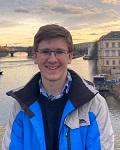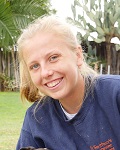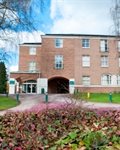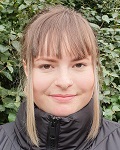Placements Profiles and Experiences
As part of the school's Paid Placement Scheme, we asked our placement students to provide both a written and video blog to talk about their experiences.
These students worked within the school in various roles supporting our Admissions Team, research centres (such as the Asia Research Institute), individual staff and much more. You can read extracts from the students' blogs below, as well as their video testimonies as part of their 'vlog' submissions.
Vlogs for the Paid Placement Scheme
Honey Harrop - vlog on Student Engagement Officer placement (Spring 2022)
Naomi Williams - vlog on placement with The Rights Lab (Spring 2022)
Kristina Lesnjak - Vlog on placement at The Rights Lab (Spring 2021)
Alisha Roy - Vlog on placement at the PGR Development team at SPIR (Spring 2021)

Samuel Bruning
Research Assistant for Dr Jason Klocek (Spring 2022)
I undertook a School of Politics and International Relations' Paid Placement working as a research assistant for Dr Jason Klocek, one of the Assistant Professors within the School. Throughout it, this opportunity both proved useful experience in academia, and a great chance to learn more about a new area of politics and international relations.
My role saw me work to identify religious civil society actors in Uzbekistan, with the aim of it serving as a case study, as part of a paper Dr Klocek is writing with a colleague. The research had two main steps: firstly, I worked to identify relevant academic and practice-based sources that may have actors within them. Then, I went through the available resources to identify the relevant civil society actors. This process taught me lots about systematic research, and how we put it into practice.
I also developed resilience, given that some weeks of research would produce little results, with others producing more results. This variation helped provide me with a realistic sample of how academic research can often either not provide the results expected, or take a while to find them.
It helps to set yourself a consistent time to complete tasks. This makes completing work more doable, because you have a dedicated time slot for it each week.
Finally, engaging with the content of the work is also important. It’s fascinating to learn about a new area or subject, as I did with religion in Uzbekistan. In being engaged, work is not a chore.

Christina Gregson
Research Assistant on the impact of COVID19 on women and girls in lower-income urban communities in the developing world, with Dr Pauline Eadie (Spring 2021)
My placement was as a research assistant helping Dr Pauline Eadie, Dr Yvonne Su and Nymia Simbulan in researching the impact of COVID19 on women and girls in lower-income urban communities in the developing world, particularly focusing on the Philippines. Primarily, my work involved reading and summarising the key findings and methods used.
My placement was remote, however I thoroughly enjoyed my meetings with Dr Pauline Eadie and Dr Yvonne Su, and found presenting my findings extremely rewarding and invaluable in consolidating my understanding.
This placement gave me a unique insight into the world of research, allowing me to participate in and contribute to academic research. I was also able to have a taste of what a PhD may look like for me. I was able to put the skills I learned at university into practice, whilst engaging with academics with similar interests to myself.
I would encourage those contemplating doing a similar placement to ask questions, both before applying and hopefully after achieving the placement.Do not be afraid to ask questions during the placement as well, as missing such opportunities can skew your perspective on the task at hand and produce a less valuable output to contribute to future research, as well as making the experience unnecessarily difficult for you!

Amelia Hacon
Research Assistant at the Law and Policy Team, The Rights Lab (Spring 2021)
I developed a number of skills over the course of my placement which will be incredibly useful to me moving forward. I feel very fortunate that I was able to learn the skill of research by working alongside Professor James Cockayne and being mentored in the process. The placement has led me to understand what it means to work towards a defined research output as well as teaching me how to do so efficiently and comprehensively. Furthermore, I now have a working knowledge of the legal and policy environment of modern slavery, which was completely unknown to me before. Overall, these skills and learned experiences will benefit me in a number of careers, not just research.
For anyone considering a similar placement, I would say that transferable skills might be more important for your application than prior knowledge of the field. I didn’t have any experience with modern slavery before being chosen for the placement, but I applied on the basis of skills I already had - and made the most of such a valuable opportunity to work closely with an expert and be active in learning as much as possible.

Thomas Moore
Research Assistant on Witchcraft trials of Lancashire and Essex/East Anglia, with Dr David Stevens (Spring 2021)
As someone who aspired to go onto postgraduate study, one of my major concerns was how I was going to gain the research experience top universities wanted. I was therefore thrilled when I received an email from the School of Politics and International Relations advertising 15 placements that could potentially give me this experience, as part of their inaugural placements programme.
The placement I applied for consisted of being a research assistant for Dr David Stevens. My role was to conduct research on the East Anglian witch trials, specifically with the broader goal of the project in mind; this was to explain these trials using a rational choice theory methodology.
What I enjoyed most about the placement was the freedom and flexibility I had. Dr Stevens gave me a significant degree of autonomy, letting me structure the research according to my intuitions. This allowed me to provide a more novel input than I would otherwise have been able to.

Phoebe Turner
Research Assistant for Dr Tyler Kustra (Spring 2022)
I was a research assistant for Dr Tyler Kustra assisting his project studying the responses of governments subjected to economic sanctions. My role was to collect and organise the existing research on the topic.
I enjoyed the exposure I got to different perspectives on the research topic. I am very interested in sanctions and undertook a dissertation studying their impact on Iranian foreign policy. I was introduced to interesting viewpoints and nuances, and I developed an appreciation for the different methods and variables used to measure the same concept.
The placement has improved my employability on top of the knowledge I gained on the subject. I am confident creating and handling databases now. I have been able to discuss this experience in interviews, including for my new administrative role in the NHS. I worked independently with some progress checks, which shows future employers that I am trustworthy, competent, and reliable. These are all valuable skills for graduating students to demonstrate, regardless of the industry, profession, and role.

Maryam Zafar
I was tasked with updating ARI’s Asia Expertise Guide which includes profiles of nearly 200 academics across the university’s three campuses in the UK, China, and Malaysia. Colleagues included in this Expertise Guide are from various disciplines and have specialist knowledge on the major challenges and opportunities in Asia. Alongside collecting and managing a vast amount of data, I also undertook training in content management system (CMS). This training has enabled me to understand the process of creating and updating webpages on the University’s official website which was completely brand-new territory for me.
My entire placement experience has been extremely positive as I have thoroughly enjoyed the work I did and learnt valuable new skills that will certainly be of use as I start my career soon. Although I thrive in a team environment, I appreciated the degree of autonomy and independent work I did during this placement. It not only allowed me to ensure I was able to balance both work and academic commitments, but it also instilled a greater sense of personal accountability and vastly improved my time management and organisational skills.
Please be aware that study abroad, compulsory year abroad, optional placements/internships and integrated year in industry opportunities may change at any time for a number of reasons, including curriculum developments, changes to arrangements with partner universities or placement/industry hosts, travel restrictions or other circumstances outside of the university's control. Every effort will be made to update this information as quickly as possible should a change occur.